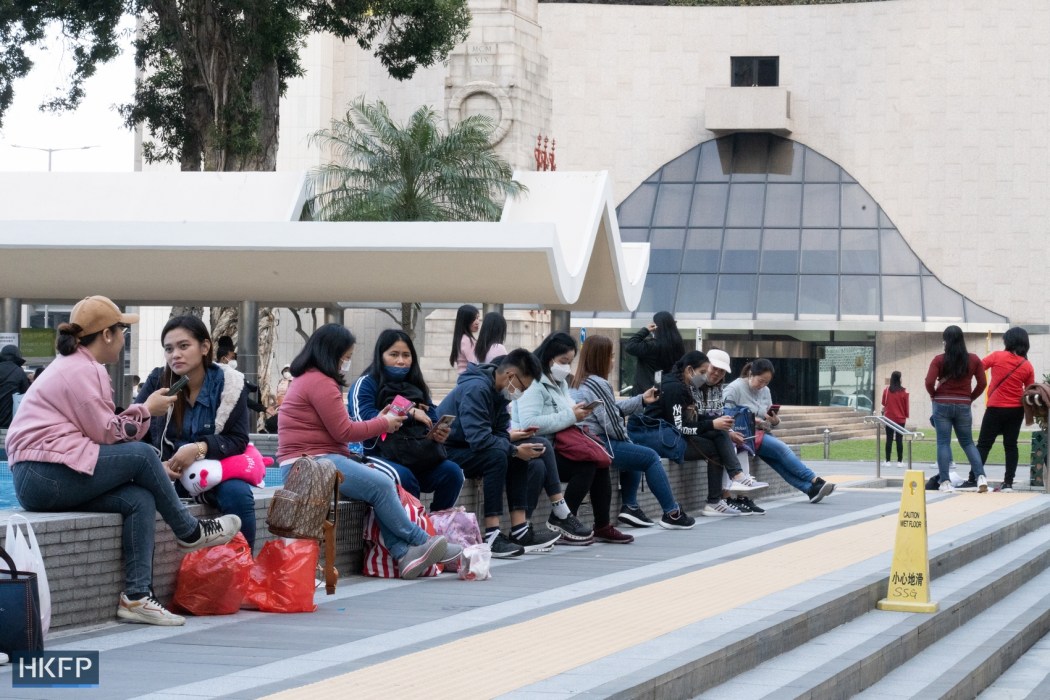Women in Hong Kong have been urged to unite and call for greater rights and government support on International Women’s Day.
In a press statement released on Wednesday, the local convenor of global campaign to stop violence against women One Billion Rising said most women in Hong Kong were expected “to take care of their family, they have no salary, no social security, no MPF and no pension.”

Without adequate and accessible child- and elderly-care options, the statement said women entering the city’s work force often relied on migrant domestic workers – many of them mothers who had left their loved ones overseas – to take care of their families while they were at work.
“Women migrant domestic workers are experiencing unequal treatment in Hong Kong society,” the One Billion Rising statement read. “Despite their help for the Hong Kong families, there is no recognition and appreciation for them as women and as workers.”
Hong Kong has around 340,000 domestic workers, mostly women from the Philippines and Indonesia. They are legally required to live in their employers’ homes, a policy that migrant domestic worker rights’ advocates have said “promotes modern-day slavery.”

Speaking at an event to mark International Women’s Day on Wednesday, Chief Executive John Lee said that women – who make up 54 per cent of Hong Kong’s population – “form an important pillar to our society” and that the government “has all along been committed to promoting women’s development and providing support to women.”
He pointed to his maiden Policy Address delivered last October, in which he announced the establishment of a Women Empowerment Fund “to support women in balancing job and family commitments,” adding that HK$100 million had been set aside in the 2023-24 Budget “to promote women’s development further.”
“To all our ladies, we celebrate your contributions to protecting our loved ones during the epidemic. We commend your efforts in helping to revive Hong Kong’s economy,” Lee said.

However, the city’s equal opportunities watchdog said last September that “notwithstanding the advancement in educational opportunities in the last few decades, women still lag behind men in terms of their economic participation and employment earnings, as well as their representation in political and public affairs, and in top executive and professional roles.”
Excluding migrant domestic workers, in 2021, 49.6 per cent of working age women in Hong Kong had entered the labour force, compared to 65.7 per cent of men, according to the Equal Opportunities Commission. Of the 1.65 million economically inactive women, almost 37 per cent said they were not earning because they had to “engage in household duties.” Just over 3 per cent of men said they were out of work for the same reason.
Women’s median monthly earnings – excluding migrant domestic workers whose minimum monthly salary stands at HK$4,730 – was HK$17,500 in 2021, lower than the HK$20,000 made by men.
Of the 90 Legislative Councillors in 2022, 17 were female, while 18.7 per cent of Election Committee members in 2021 were women.
Cancelled women’s rights march
A police-approved march for women’s rights, organised for last Sunday by the Hong Kong Women Workers’ Association, was called off the day before without explanation.
The cancelled march would have been one of the first political rallies in the city since the Covid-19 outbreak over three years ago, during which police cited health concerns as reasons for banning demonstrations such as the city’s annual Tiananmen vigils in 2020 and 2021.
Despite being called off, dozens of police officers were seen near Southorn Playground in Wan Chai on stand by on Sunday morning, where the march would have begun. Officers conducted a number of stop and searches.
The 25yo man who called himself YY was stopped and searched in Wan Chai when his placard was still resting in his backpack. He made the card for the women’s March but the March was cancelled last night for unclear reasons. https://t.co/2bxzOcQQk1 pic.twitter.com/nyITvz8i6Q
— Xinqi Su 蘇昕琪 (@XinqiSu) March 5, 2023
There was no visible turnout to the protest. One man, however, showed up with a placard reading “femicide is your responsibility too.”
He referred to the recent murder of Abby Choi which has gripped local and international media, adding that misogyny was akin to tacit consent for gender-based violence.
However, around 1,000 people attended the 10th One Billion Rising event in Central on Sunday. Attendees enjoyed a programme of talks, activities, workshops and performances organised by migrant worker groups.
Additional reporting: Hillary Leung
Support HKFP | Policies & Ethics | Error/typo? | Contact Us | Newsletter | Transparency & Annual Report | Apps
Help safeguard press freedom & keep HKFP free for all readers by supporting our team

LATEST FROM HKFP
HKFP has an impartial stance, transparent funding, and balanced coverage guided by an Ethics Code and Corrections Policy.
Support press freedom & help us surpass 1,000 monthly Patrons: 100% independent, governed by an ethics code & not-for-profit.










